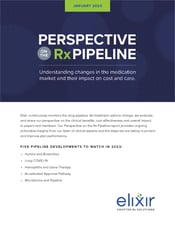From biosimilars and COVID-19 to gene therapy and microbiomes, there are several developments in the pipeline to watch for this year. Learn more in this edition of Perspective on the Rx Pipeline.
1. Humira and Biosimilars
Since the first approval in 2015, biosimilars have been a hot topic, and this year will be no exception due in part to AbbVie’s $20 billion drug, Humira, and its expected loss of exclusivity.[1] Humira was originally approved in 2002 and has since been the frontrunner in the tumor necrosis factor (TNF) inhibitors market. Originally marketed as a low concentration product, Humira released a higher concentration in 2017.[2] Currently, there are nine Humira biosimilars that are FDA-approved. By mid-2023, it is expected that eight low concentration and four high concentration products will launch. It is anticipated that this expanded competition within the Humira biosimilar space will help drive down pharmacy spend.
2. Long COVID-19
In the three years since COVID-19 changed the world, approximately 650 million cases have been confirmed, and over 6 million deaths worldwide.[3] Almost half of those who survive experience lingering symptoms, known as Long COVID.[4] Symptoms of long COVID vary widely but some of the most common include extreme fatigue, difficulty thinking or concentrating, shortness of breath, cough and muscle or joint pain. There haven’t been as many breakthrough treatments for long COVID discovered yet in comparison to the vaccines to prevent and antivirals to treat acute disease. While there may be some promising options being studied, the trials that are underway are in the beginning stages.
3. Hemophilia and Gene Therapy
Many gene therapies are in the pipeline, but the hemophilia gene therapies are capturing a lot of attention due to the recent approval of Hemgenix® for hemophilia B, and its hefty price tag. Specialty spend for hemophilia has been one of highest per-member therapy costs before gene therapy.[5] Hemophilia patients have impaired coagulation cascades which leads to excessive bleeding. The hope is that the recently approved Hemgenix and future gene therapies can significantly reduce use of continued prophylactic treatment and on demand factor replacement situations while showing a favorable safety profile.
4. Accelerated Approval Pathway
Drug manufacturers may be granted accelerated approval to allow earlier approval of drugs that may treat a serious condition.[6] With this, they have to conduct a confirmatory trial to keep approval status. If data is not conclusive or the study isn’t conducted, the accelerated approval may be withdrawn from market either voluntarily by the manufacturer or via FDA proceedings.[7] In recent years, there have been concerns with FDA follow up on drugs or biologics that have received accelerated approval. In many instances, sponsors have had delays in confirmatory clinical trials, which delays the FDA’s ability to facilitate approval conversion. Recently, the FDA has proposed to resolve the issue of clinical trial delays. The FDA is considering penalizing companies that don’t meet accelerated approval requirements in the future.[8]
5. Microbiome and Pipeline
A microbiome is a group of microorganisms (all living organisms possibly consisting of fungi, bacteria and virus) that exist together in a particular environment, such as the human body.[9] These microorganisms may be helpful, benign, or harmful. Researchers are starting to develop a hypothesis that disruption to microbiomes may cause or worsen disease. Helpful microorganisms are being studied to be used as medical treatments for certain disease states. The microbiome has even been quoted as the “last organ” in research.[10] These products may find their way into prescription coverage in the near future.
Download the full report for more information on all of these developments.
References:
- Biosimilar and Interchangeable Biologics: More Treatment Choices. https://www.fda.gov/consumers/consumer-updates/biosimilar-and-interchangeable-biologics-more-treatment-choices. Accessed 12/13/2022
- IPD Analytics RxBrief. Settlement Agreement May Allow July 2023 Launch of High-Concentration Humira Biosimilars. March 2022.
- WHOCoronavirus (COVID-19) dashboard. https://covid19.who.int/; 2021. Accessed 12/19/2022.
- O'Mahoney, L. L., Routen, A., Gillies, C., Ekezie, W., Welford, A., Zhang, A., Karamchandani, U., Simms-Williams, N., Cassambai, S., Ardavani, A., Wilkinson, T. J., Hawthorne, G., Curtis, F., Kingsnorth, A. P., Almaqhawi, A., Ward, T., Ayoubkhani, D., Banerjee, A., Calvert, M., Shafran, R., … Khunti, K. (2022). The prevalence and long-term health effects of Long Covid among hospitalised and non-hospitalised populations: A systematic review and meta-analysis. EClinicalMedicine, 55, 101762. https://doi.org/10.1016/j.eclinm.2022.101762
- Hematology: Hemophilia. IPD Analytics. .Accessed December 20, 2022. https://www.ipdanalytics.com/
- Center for Drug Evaluation and Research. (2022, December 1). Accelerated Approval Program. U.S. Food and Drug Administration. Retrieved December 21, 2022, from https://www.fda.gov/drugs/nda-and-bla-approvals/accelerated-approval-program
- Beakes-Read, G., Neisser, M., Frey, P., & Guarducci, M. (2022). Analysis of FDA's Accelerated Approval Program Performance December 1992-December 2021. Therapeutic innovation & regulatory science, 56(5), 698–703. https://doi.org/10.1007/s43441-022-00430-z
- (2022, July). CDER guidance agenda new & revised draft guidance documents planned for ... CDER Guidance Agenda New & Revised Draft Guidance Documents Planned for Publication in Calendar Year 2022. Retrieved December 21, 2022, from https://www.fda.gov/media/134778/download
- National Human Genome Research Institute . (2022, December 19). Microbiome. Retrieved December 21, 2022, from https://www.genome.gov/genetics-glossary/Microbiome
- Berg, G., Rybakova, D., Fischer, D. et al.Microbiome definition re-visited: old concepts and new challenges. Microbiome 8, 103 (2020). https://doi.org/10.1186/s40168-020-00875-0


